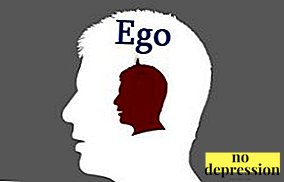I prepared this article a long time ago, but still could not write it for the reason that I was not sure that I have a complete idea of how to get rid of obsessive thoughts.
Now I learned from my own experience how to cope with such thoughts and I am fully ready to tell you about it.

Perhaps some of my readers think that from the moment I started creating this site, I completely got rid of all personal problems. Indeed, I have already changed a lot by the time of the first entries in this blog, but my current state cannot be called complete freedom from negative emotions, prejudices and fears.
My position can be described as a struggle with oneself, in the course of which experience and materials for these articles are born. Of course, in this confrontation between my true Self and the primitive, instinctive, emotional I, the first one gradually wins.
But this struggle continues: two steps back and four steps forward. Self-development stems from the consciousness of one’s own shortcomings and work on them. If there is no struggle, then this does not mean a final victory, but rather a surrender.
After all, self-development is an endless process. I continue to face some problems and struggle with them. Including obsessive thoughts.
Mental "chewing gum"
I always had these thoughts. They could occupy my head and make me nervous, endlessly referring to the same experiences. It was like a mental chewing gum.
I constantly chewed in my head the same thoughts, tried to solve them, untie some imaginary knot. But from my attempts to weaken him, on the contrary, he fastened even more.
I remember how I, in my distant childhood, could not stop thinking about some things that I could not think of at all. It must be that my brain’s habit of endlessly “processing” some experiences and ideas was aggravated during times of panic attacks and other psychological problems.
I recently realized that I had learned to work with obsessive thoughts. Moreover, I am ready to formulate a method that allows me to get rid of them. I realized that this article can now finally appear.
Obsessive thoughts are emotions
This is the first thing you need to understand. Obsessive thoughts have an emotional, unconscious, irrational nature. They are connected with your fears, anxieties and complexes that are not sensible.
That is why they are intrusive. The emotions that form in you make you constantly think about something. They seem to signal "Problem! Problem! We must find a solution!"
This is like a notification in Windows or another operating system that appears as an icon and will annoy your eyes until you update a program, remove a virus or install the necessary driver.
We can say that obsessive thoughts have a positive function. They remind you of the problems that you have to solve. And you can not just take and turn off these "notifications". It's hard to die of hunger when your brain constantly reminds you of food.
But, unfortunately, not always obsessive thoughts tell us about a real problem. The mechanism for the appearance of these thoughts is quite subtle. And if, due to some reasons, the “standard settings” of this mechanism get lost, then natural human fears and concerns can take an extreme form, manifesting itself in the form of obsessive thoughts, which are very difficult to get rid of.
Everyone knows how normal health care can turn into hypochondria, as the natural fear of danger threatens to turn into paranoia.
And here you become a regular visitor of medical forums, and thoughts about your health do not leave your head. Maybe you constantly think about danger while you are on the street. Or you cannot get out of your head the thoughts about what people think about you, although you yourself do not see any point in thinking about it.
The conclusion I want to make is that obsessive thoughts are based on emotions. Therefore, they do not have a rational nature. Therefore, they cannot be fought with logic.
This is a very important conclusion. I watched myself a lot, tried to understand how these thoughts appear and how they disappear, how my mind tries to deceive and confuse me. Earlier, in the evening, when I was very tired, I could not stop some thoughts.
For example, I could begin to think something bad about myself, blame myself. No matter how skillful the internal lawyer is, who tried to convince me with logic and common sense that everything is not so bad (although of course he didn’t rule out problems), the accuser always got the upper hand, and everything became more complicated. The more I tried to justify myself and get rid of annoying thoughts with the help of thoughts, the more I got confused and the more I was overcome by these thoughts. This sport with itself led to the fact that the invisible knot was tightened even more.
The next day, in the morning, I didn’t even want to think about this problem. If I started thinking about yesterday’s “dialogue” with myself, then I understood that the problem was there, but it was greatly inflated and exaggerated by my condition. I realized that the problem must be solved, and not to think about it. There is no sense in these thoughts.
After some time, I realized what was the deception and deceit of these thoughts. If you try to destroy them with logic, they will still prevail, because they are irrational and illogical and make you believe in absurd ideas, before which common sense is powerless.
You can not eliminate obsessive thoughts with logic
If you are committed to self-incrimination, you will continue to blame yourself, even if you don’t blame yourself. Because this is your mood and it is from this that these thoughts flow, and not because of some real situation! Even if you suddenly manage to convince yourself for a minute of the groundlessness of these thoughts, then after a while they will return again if you resist them and continue to give them a logical rebuff.
If you have a mood in which you think that you are ill, that something bad happens to your health, then no positive test results will convince you of the opposite. "What if the tests turned out to be inaccurate?", "And what if I have something else?" - you will think.
And you will not see the end of these thoughts, no matter how absurd from the position of common sense, they were not.
It is useless to try to disprove them. Because it is impossible. They will return and attack you with the help of new absurd arguments that you will believe in, since you are in such an emotional state that gives rise to these thoughts about non-existent problems.
Remember the state when you worry about something. No matter how much you convince yourself that everything will be fine, that there is no reason to worry, your perception, distorted by nervous tension and anxiety, draws you a perspective in the darkest tones. Not because everything is really bad, but because you now perceive everything so. If in such a state you start thinking a lot and talk about the future, then your negative perception will attract your thoughts to the “negative” pole and it will be difficult to break free from this attraction.
Method of getting rid of obsessive thoughts
You will need common sense, but only at the very beginning.
First of all, you need to figure out whether your obsessive thoughts are based on some real problem. It happens that mental chewing puzzles you, exaggerating the problem. But exaggerated problem does not mean the absence of such.
So think about the reasons for these thoughts. Getting rid of thoughts, you should not ignore the problem, if it exists. For example, it seems to you that you have some kind of illness and thoughts about it do not leave your mind.
Maybe it really is not unfounded fears, and you have the symptoms of some disease. If so, go to the doctor. If you have already done this and you have not found anything - forget it.
Regardless of whether there is a problem or not - to think about it constantly makes no sense! You either try to solve it if it is there, or forget about everything, if it does not exist.
This is the only time in the fight against obsessive experiences, in which you need to apply logic and common sense.
What to do?
Choose a moment in time when you are in the best morale, when you have more optimism and strength than usual. For example, in the morning when you are full of energy, after exercise or after meditation.
Convince yourself that there is no point in scrolling thousands of times the same thoughts in your head. That these thoughts are deceptions or exaggerations, the purpose of which is to confuse you.
Understand the following things well.
- you will not come to the solution of the problem if you constantly think about it
- obsessive thoughts do not have any rational basis, and if they are associated with a problem, then you will solve it instead of constantly returning to it with thoughts
- one cannot get rid of mental gum with logical reasoning and reflection
Realize the absurdity of obsessive thoughts
Then you can once again, with the help of several logical theses, expose all the absurdity of obsessive thoughts. For example: "I have nothing to fear, because the analyzes did not show anything," "they do not die of panic attacks, I read about this more than once," "no one tries to harm me," "even if there are really things to be afraid of you don’t need to think about them 1000 times a day, it will only lead to nervous exhaustion. "
Your argument against obsessive thoughts should be coherent and concise. You should not get involved in an argument with yourself. Remember, in a long dispute with obsessive thoughts, you are doomed to failure, in which emotions and fears will prevail over logic and mind and negative perception will itself “pull” thoughts to the negative pole.
To destroy the power of this attraction you need to think less. When you think about annoying thoughts, chew on them endlessly, you only strengthen them.
Give yourself the setting to ignore obsessive thoughts.
Tell yourself that you will no longer think about what you think all day and that plagues and torments you. Indeed, why constantly chew a mental chewing gum when it brings no sense?
Obsessive thought is a repetition of the same thought in different ways. You will not receive any new and valuable information from it, you will not come to any decision.
Therefore, give yourself the installation not to get involved in fruitless reflections. After you have said this to yourself, made a promise that you will not break, draw an invisible line. After this trait, you no longer pay attention to obsessive thoughts.
Do not expect that thoughts will not return
They will return more than once. Tune in like this: "Let them come back, what the difference, I realized that these thoughts are a deception and do not belong to a real problem."
Thoughts will return, sometimes you will again begin to untie this knot in your head. As soon as you notice that you are again carried away with this, smoothly divert attention to one side. Do not argue with these thoughts, do not be upset that they came (and they will come), ignore them, treat them with complete indifference.
If suddenly you need to remind yourself of the absurdity of these thoughts, do not go beyond short formulations: "nothing will happen to me, and that's all." Do not engage in a dispute in which you will never win. All the endless arguments that make you afraid or nervous again are lies and deceptions.
Remember what I said in the article: if you are in a psychological state in which you tend to worry about your health or your future, or about your loved ones, then your mind will focus on this fear, no matter how absurd this fear may be. . Do not turn your mind against yourself.
You must know the puzzle toy, which is like a tube. If both ends of this tube are shoved with the index fingers of different hands and try to free them by physical effort, pulling the arms in different directions, then nothing will come out, the tube will only squeeze the fingers stronger. And if you relax and do not pull - everything will turn out.
The same applies to obsessive thoughts. No need to want to get out of them by any means. Relax, "hammer", let them be.
Be indifferent!
Your indifference towards obsessive thoughts will deprive obsessive thoughts of their emotional content, which fills them with a force that you sometimes cannot cope with. Over time, you will learn to manage your attention and notice those moments when you began to think again about what you should not.
Then thoughts will leave you forever.
But one should not wait with impatience, when this happens: “when they leave!”, “I try not to pay attention to them, but they still don’t get out of my head!”. Such thoughts are not necessary!
Arm yourself with saving indifference: thoughts don't bother you — well, they returned — that's fine, too. No need to turn thoughts about the appearance of obsessive thoughts into obsessive thoughts the same!
There is no big deal that repeated thoughts keep coming to you. If you are deprived of their emotional "charge" and try to ignore them, then they do not torment your nerves as before. In this case, they become just annoying notification window (such windows you could see on your computer), which sometimes appears in your head.
And this is not so scary. You can live with it. Thoughts appear sometimes, but they no longer attract your attention or confuse you. These are just short signals in the head that appear and disappear.
When I began to treat obsessive thoughts that way they left my head and I learned how to deal with them. And the struggle with obsessive thoughts is the absence of struggle, if we take the struggle as violent resistance. Relax!
Conclusion
I have already said in other articles that mental illnesses: depression, panic attacks, obsessive thoughts can either break you or make you stronger (as in the statement of a famous philosopher).
Fighting panic attacks can teach you how to work with your fear. Working to get rid of depression will help you find a source of happiness in yourself. And trying to control obsessive thoughts will teach you how to manage your attention and control your mind.
Arm yourself with patience and work on yourself, then you will not only get rid of your ailments, but as a result you will receive valuable and useful experience that will be useful in your life!
My step by step video course about getting rid of panic attacks and obsessive thoughts!

I gathered all my experience in helping people with panic attacks and obsessive thoughts, all my knowledge about the problem and presented them in my new 17-day video course “WITHOUT PANIC”! Over 7 hours of videos that will teach you to overcome fear and anxiety. 3 hours of audio meditation, with which you can get rid of obsessive thoughts, eliminate panic and develop important mental skills of self-control and relaxation.
Reviews about the course can be read here and here.



